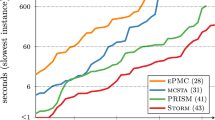Summary.
This paper proposes a framework for detecting global state predicates in systems of processes with approximately-synchronized real-time clocks. Timestamps from these clocks are used to define two orderings on events: “definitely occurred before” and “possibly occurred before”. These orderings lead naturally to definitions of 3 distinct detection modalities, i.e., 3 meanings of “predicate \(\Phi\) held during a computation”, namely: \(\mathop{\bf Poss}^{\stackrel{{\it db}}{rightarrow}}\Phi\) (“\(\Phi\) possibly held”), \(\mathop{\bf Def}^{\stackrel{{\it db}}{\rightarrow}}\Phi\) (“\(\Phi\) definitely held”), and \(\mathop{\bf Inst}\Phi\) (“\(\Phi\) definitely held in a specific global state”). This paper defines these modalities and gives efficient algorithms for detecting them. The algorithms are based on algorithms of Garg and Waldecker, Alagar and Venkatesan, Cooper and Marzullo, and Fromentin and Raynal. Complexity analysis shows that under reasonable assumptions, these real-time-clock-based detection algorithms are less expensive than detection algorithms based on Lamport's happened-before ordering. Sample applications are given to illustrate the benefits of this approach.
Similar content being viewed by others
Author information
Authors and Affiliations
Additional information
Received: January 1999 / Accepted: November 1999
Rights and permissions
About this article
Cite this article
Stoller, S. Detecting global predicates in distributed systems with clocks. Distrib Comput 13, 85–98 (2000). https://doi.org/10.1007/s004460050069
Issue Date:
DOI: https://doi.org/10.1007/s004460050069




